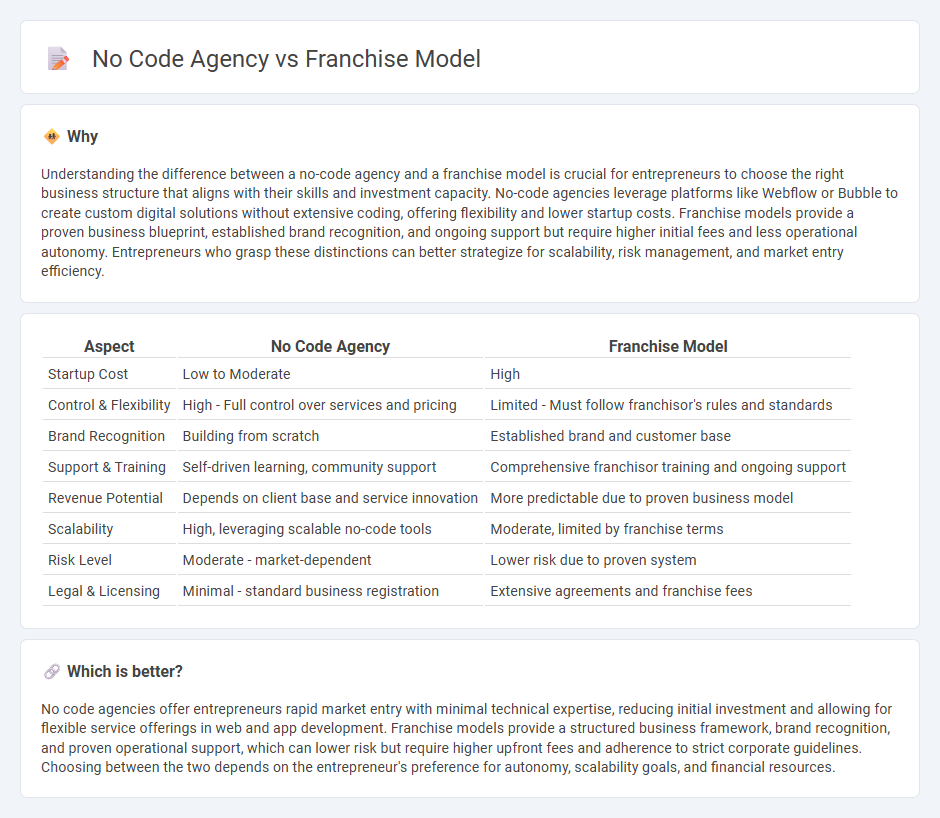
Entrepreneurship in the digital age offers diverse pathways such as launching a no-code agency or investing in a franchise model, each with unique scalability and operational frameworks. No-code agencies leverage platforms like Webflow and Bubble to rapidly develop custom applications without extensive programming knowledge, reducing upfront costs and accelerating time-to-market. Discover the strategic advantages of both models to determine the best route for your business aspirations.
Why it is important
Understanding the difference between a no-code agency and a franchise model is crucial for entrepreneurs to choose the right business structure that aligns with their skills and investment capacity. No-code agencies leverage platforms like Webflow or Bubble to create custom digital solutions without extensive coding, offering flexibility and lower startup costs. Franchise models provide a proven business blueprint, established brand recognition, and ongoing support but require higher initial fees and less operational autonomy. Entrepreneurs who grasp these distinctions can better strategize for scalability, risk management, and market entry efficiency.
Comparison Table
| Aspect | No Code Agency | Franchise Model |
|---|---|---|
| Startup Cost | Low to Moderate | High |
| Control & Flexibility | High - Full control over services and pricing | Limited - Must follow franchisor's rules and standards |
| Brand Recognition | Building from scratch | Established brand and customer base |
| Support & Training | Self-driven learning, community support | Comprehensive franchisor training and ongoing support |
| Revenue Potential | Depends on client base and service innovation | More predictable due to proven business model |
| Scalability | High, leveraging scalable no-code tools | Moderate, limited by franchise terms |
| Risk Level | Moderate - market-dependent | Lower risk due to proven system |
| Legal & Licensing | Minimal - standard business registration | Extensive agreements and franchise fees |
Which is better?
No code agencies offer entrepreneurs rapid market entry with minimal technical expertise, reducing initial investment and allowing for flexible service offerings in web and app development. Franchise models provide a structured business framework, brand recognition, and proven operational support, which can lower risk but require higher upfront fees and adherence to strict corporate guidelines. Choosing between the two depends on the entrepreneur's preference for autonomy, scalability goals, and financial resources.
Connection
No code agencies leverage franchise models by offering scalable, replicated business systems that enable rapid expansion without heavy technical overhead. Franchise owners can utilize no code platforms to customize and deploy digital solutions efficiently, reducing time-to-market and operational costs. This synergy accelerates entrepreneurship by democratizing software development and streamlining franchise scalability.
Key Terms
Licensing Agreement
A franchise model operates under a licensing agreement granting the franchisee rights to use the brand, business model, and proprietary systems, often requiring royalties and adherence to strict operational standards. No code agencies typically avoid traditional licensing agreements, instead offering flexible service contracts or subscription-based access to proprietary tools without upfront franchise fees. Explore the benefits and legal nuances of licensing agreements in franchise models versus no code agency arrangements to optimize your business strategy.
Proprietary Platform
A franchise model leverages a proprietary platform to standardize operations, ensure brand consistency, and streamline customer experiences across multiple locations. In contrast, a no-code agency utilizes flexible no-code tools to rapidly develop custom solutions without proprietary restrictions, offering tailored services but less uniformity. Discover more about how proprietary platforms can transform your business strategy.
Revenue Sharing
Franchise models in business typically involve upfront fees and ongoing royalties, creating a consistent revenue-sharing stream between franchisor and franchisee. No-code agencies, however, often leverage revenue sharing by partnering directly with clients, sharing profits generated from deployed no-code solutions without large initial investments. Explore in-depth strategies and benefits of revenue-sharing approaches in both franchise models and no-code agencies to optimize your business growth.
Source and External Links
Types of Franchise Models Explained - The franchise model varies from product distribution (franchisees sell franchisor's products with autonomy) to manufacturing (franchisees manufacture and distribute products under franchisor's standards), with Coca-Cola and Subway as examples respectively.
Types of Franchise Business Models - Franchise models include COCO (company-owned company-operated), COFO (company-owned franchise-operated), FOCO (franchise-owned company-operated), and FOFO (franchise-owned franchise-operated), defining ownership and operational roles.
The Franchise Business Model: Everything You Need to Know - Franchising is a contractual relationship allowing franchisees to use franchisor's branding and business model in exchange for fees and royalties, with common types being business format, product, and manufacturing franchises.
 dowidth.com
dowidth.com